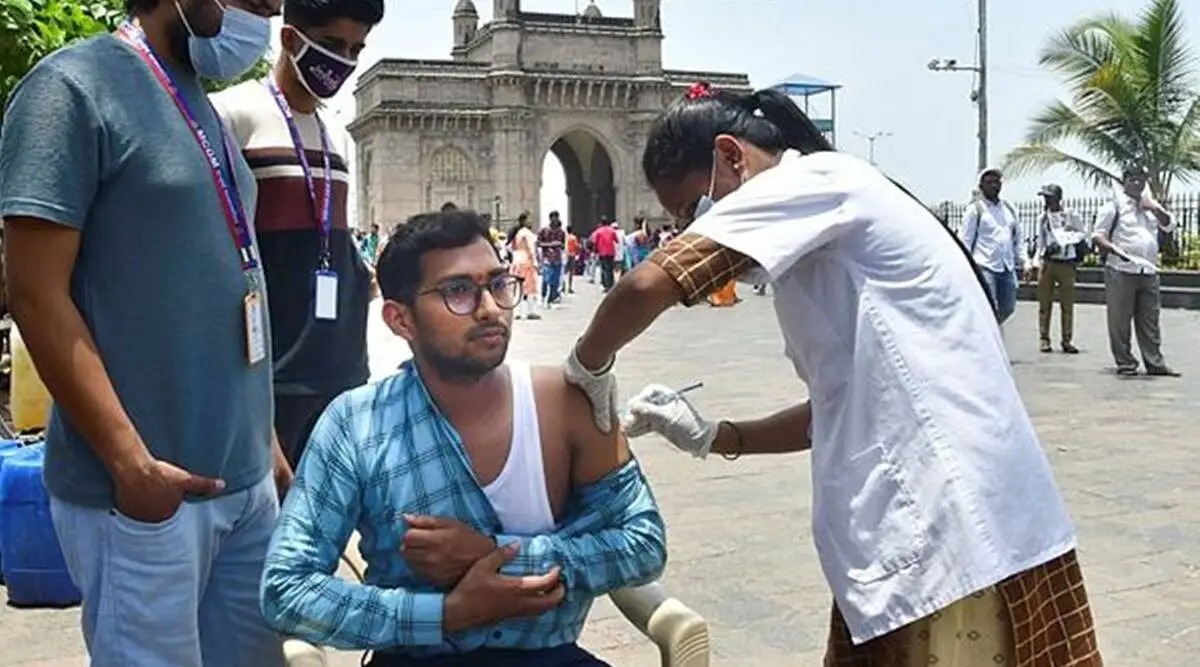 A healthcare worker administers a dose of Covid-19 vaccine to a beneficiary, at Gateway of India, in Mumbai. (PTI, file)
A healthcare worker administers a dose of Covid-19 vaccine to a beneficiary, at Gateway of India, in Mumbai. (PTI, file)Is it normal for a Covid-19 recovered patient to contract infection within a two-month window? Does that mean that even infection-acquired immunity is not protecting us? But if experts are to be believed, there is no reason to worry. “Currently, there are many sub-variants of the virus in circulation simultaneously. And the immunity acquired from contracting infection because of a particular sub-variant doesn’t mean that you are fully protected from a rival sub-variant. But definitely you are protected from severe manifestation of the disease in a successive re-infection scenario,” says Dr Nikhil Modi, Consultant, Respiratory Medicine, Indraprastha Apollo Hospital, New Delhi.
“There is no need for prolonged quarantine or a re-test and the recovered patient can resume normal activities after five to seven days when the fever has settled. One doesn’t need to bother about infectivity once the fever subsides,” he adds.
Successive infections are also pushing up Covid-19 numbers across metros with Mumbai witnessing the highest one-day surge after June 30 with 1,201 cases recorded on Thursday, a 23 per cent jump in 24 hours. However, the test positivity rate (TPR) — the number of positive cases out of the total tests conducted — stood at 10.30 per cent on Thursday with 11,253 tests.
Doctors attribute the surge in cases to the violation of Covid-19 appropriate behaviour, overcrowding at ongoing festivities and emergence of new sub-variants. “It is too early to comment if the city is witnessing another spike. We will be vigilant over the next week,” says Dr Mangala Gomare, executive health officer, Brihanmumbai Municipal Corporation (BMC). Besides, now that people are COVID-aware, more people are getting tested the moment they develop influenza-like symptoms. “Most of the recent cases are ‘incidental’ where patients are being diagnosed while undergoing non-Covid related treatment. A person suspected with monsoon-related ailments like dengue, malaria or swine flu is also being tested for Covid-19,” says Dr Rahul Pandit, member of the state Covid-19 task force.
Subscriber Only Stories
Despite the rise in cases, the hospitalisation remains low as the circulated strain of the virus is less virulent. On Thursday, out of the newly detected patients, only 56 patients needed hospitalisation in Mumbai.
Officials believe that the more transmissible variant of Omicron — BA.2.75 — is the driving force behind the recent surge in Covid-19 cases. “The latest genome sequencing of the samples have shown that BA.2.75 is dominating over other variants in the state. But thankfully, it is not causing any severe infection as the death rate remains low,” says Dr Pradeep Awate, state surveillance officer.
“It is as transmissible as previous sub-variants of Omicron,” says Dr Modi, adding that if “you are around an infected person, you have a high chance of contracting it.” This means that even if one person in a family tests positive and others show the same symptoms, chances are that they have been infected. Many reports have already said that the newer sub-variant is more transmissible by 20 to 30 per cent . Also patients with worsening symptoms requiring hospital attention need to get tested for multiple infections of COVID-19 co-existing with dengue.
“Clinically this surge is mild, possibly caused by a new sub-variant of Omicron. This means there are no life-threatening symptoms, severity of the disease or dip in oxygen levels that warrant our anxiety. Please understand that deaths are being hastened by existing co-morbidities, not COVID 19 itself. But the symptomatic manifestation is much more than the first wave of Omicron. This time, the fever is on the much higher side, patients are suffering chills and getting bad headaches, backaches and a sore throat. Sometimes I have had patients finding it difficult to swallow as their throat is hurting badly,” says Dr Modi. “The high fever lasts for about three odd days, starts settling by the fourth day and then there is gradual remission between the fifth and seventh days. The sore throat and itchiness may persist for a while,” he adds.
“Immunity, we must remember, is strain-specific. And for a virus that mutates and changes its genetic make-up, the vaccine may not have a targetted response and not work fully against the new virus but gives you an umbrella protective shield. Besides, for a population that has mostly got some variant of the COVID-19 and been vaccinated, the hybrid immunity seems to be working better,” says Dr Modi.